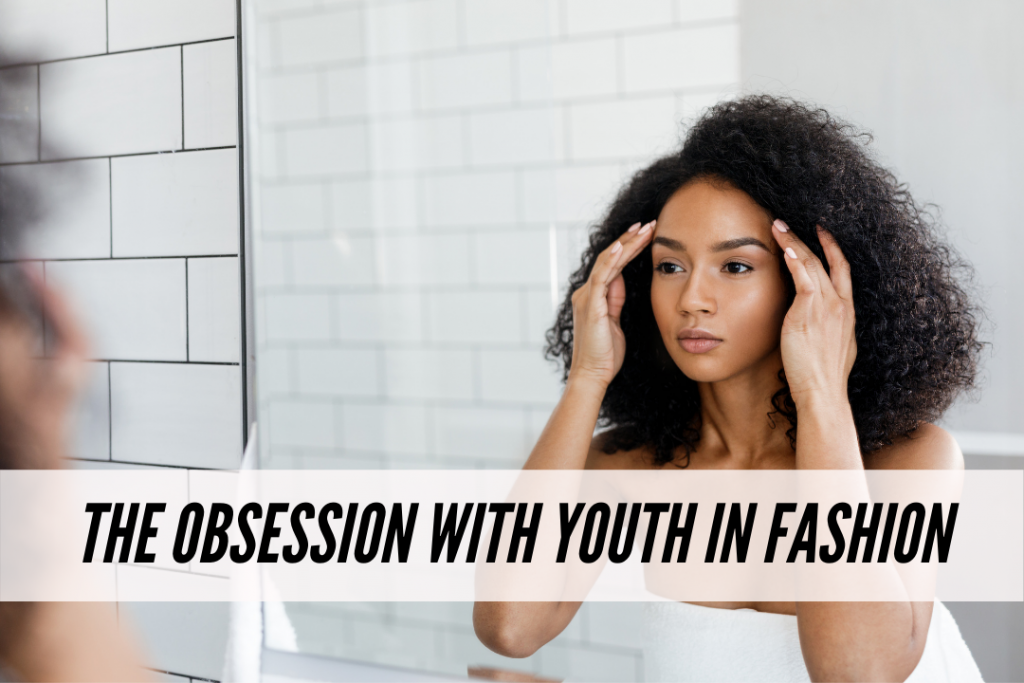
Recently, I was at home for spring break and went to lunch with with my mom at the middle school where she works. When I entered the building, I was quickly mistaken for a student.
This happens to me frequently; I look young for my age.
This has always been the case, so I’m used to it by now. People always mistake me for being much younger and, when I correct them, the first thing they say is: “you’ll appreciate that so much when you’re older.”
This sentence is something I’ve been hearing all my life but, recently, I started thinking about the why behind it.
Society places so much emphasis on looking younger than you are and all of the perks that come with youth and a youthful appearance. And it’s all very bizarre when you start thinking about it.
Today, I want to examine our culture’s obsession with youth, sharing the ways that youth is praised and sometimes even fetishized in our world. Let’s get into it.
Table of Contents
Youth and Fashion

One of the places where youth obsession is most prevalent is one that’s close to home: the fashion industry. As we’ve discussed here in the past, it’s common for designers to use underage models in runway shows. Not only can this be harmful to the models who have to handle a stressful job and a lot of criticism at a young age, it also can create incredibly unrealistic beauty standards.
If the ideal “model” body is, many times, a child’s body, women cannot possibly live up to the ideal. It’s not for lack of trying: Women of all ages are constantly pressured to attempt to recapture the body they had while they were young. This is nearly always a losing game. I’ve seen countless commercials where women in their forties brag about “getting back to their high school weight,” which oftentimes is just not a natural weight for their 40-year-old body. Cue the yo-yo diet. Alternatively, teenage girls are encouraged to maintain their youthful bodies at all costs, which can lead to them using unhealthy methods to do so.
Youth and Beauty
There is a monumental emphasis on looking young in the beauty industry. In fact, the industry is essentially built around it: In 2013 alone, the U.S. anti-aging skin care market generated 2.1 billion dollars in retail sales.
These days, there are creams and serums and masks and sprays and cleansing waters that all claim to lift and brighten and tighten. These products are even marketed to women in their twenties under the idea of “it’s never too early to start.” There are also plenty of skincare products that promise “baby soft” skin or makeup like Maybelline’s popular “Baby Lips” line. (It only recently occurred to me how strange it is for us to covet the lips of a newborn.)
There has also been a lot of discussion lately regarding the negative view of female body hair and what that says about us as a society. Especially since body hair and facial hair are usually seen as marks of adulthood for men. Why is that not the case for women? Often we’re conditioned to treat our hair like it’s unclean and encouraged to get rid of it, instead of embracing it as a sign of womanhood.
Youth and Mainstream Media
The media puts youth and youth culture on a pedestal, too. Musical acts like Melanie Martinez, Lana Del Rey, and Miley Cyrus go as far as glamorizing prepubescence. In her most recent album, called Cry Baby, Melanie Martinez created a persona of a child and many of the themes of her songs and videos revolve around this idea, sometimes in a sexualized manner. Miley Cyrus did a similar concept with her BB Talk song and video. Lana Del Rey also frequently references the Lolita trope as a positive thing in her music and has faced a lot of criticism for it.
Youth obsession is also seen in advertisements. One prominent example is American Apparel’s now-infamous ads. Their much-discussed campaigns heavily feature models that are underage or barely 18, posed suggestively. Additionally, Marc Jacobs got in trouble a few years ago for how he chose to market his Lola perfume. His ad received a lot of backlash and was banned in the UK for featuring an underage Dakota Fanning in what was considered to be a “provocative” ad.
The Negative Effects of Emphasizing Youth

Some might think that our obsession with youth is harmless, but others argue that it affects people, specifically women, in many negative ways. I won’t get into all the effects – it would take another few articles – but I’ll list three big ones below.
First, many people argue that youth obsession normalizes the idea of seeing underage individuals as sexual objects. This cultural shift can lead to a lot of victim blaming when underage people are taken advantage of and may even encourage predatory behavior as a result.
Additionally, the emphasis on youth makes it seem like all women have to offer are their looks. In a youth-obsessed culture, older women are less valued by society, especially if they look their age. Many older actresses talk about the dramatic decline in roles the see after they reach a certain age (which can be as young as 30!).
There is such an emphasis on looking young and fitting in with youth culture that it creates an interesting catch-22 with business and work. On one hand, the popularity of “30 Under 30” lists, for example, makes it seem like everything has to be accomplished while you’re young. But many people have mentioned this pressure acting as a double-edged sword: while you feel like things need to be achieved early, it can also be difficult to be taken seriously if you look young. This article discusses the challenges faced by people who look much younger than they are and how that has negatively affected them. It seems we truly cannot win.
Conclusion
Our society places a lot of emphasis on looking and being young. This pressure can contribute to many harmful ideas. It can also lead to destructive things like fetishization of youth and victim blaming.
Additionally, the youth obsession creates a catch-22 where women are both held to ridiculous standards and looked down upon when they struggle to reach them. At the end of the day, women have so much more to offer than their looks. After all, much of the wisdom we’ll obtain comes with age and experience. Age should be embraced and not ridiculed; I hope more awareness on the subject can bring us closer to this goal.
What do you think?
Have you noticed an emphasis on youth in mainstream culture? Have you ever thought about this topic before? How does this affect us as young adults? Let me know your thoughts below!

Loved this article. I think being exposed to role models who are more than just a pretty face also have an influence on us. While my mother is presentation/socially obsessed, my older sister was many times more successful in being an educated and ethically driven woman. While I like to take care of myself, it’s not what my world revolves around.
LOVE this! While this is something I’ve thought about before,you brought up some great specifics- I had definitely never thought about maybellines baby lips before (I have it!!) but that is so weird when you think about it. The way you phrased all this, especially the body hair part, was fantastic
Excellent article. I would like to add MTV is the most guilty of all of this.
I love this article. I have found that I’ve struggled with looking really young because honestly it has a influence on your confidence. My brother has a friend whose sister basically was put in the back because she looked too young and it might have thrown people off. It’s very frustrating hoping people take you seriously, in the work force and in personal relationships.
I ALWAYS hate when I get told that I’d appreciate it when I’m older, because I will not be getting my first job at 40 years old. It’s weird that people fetish youth but when a person naturally looks young then it’s not good enough because they look too young. It’s a weird middle area that no one seems to fit in.